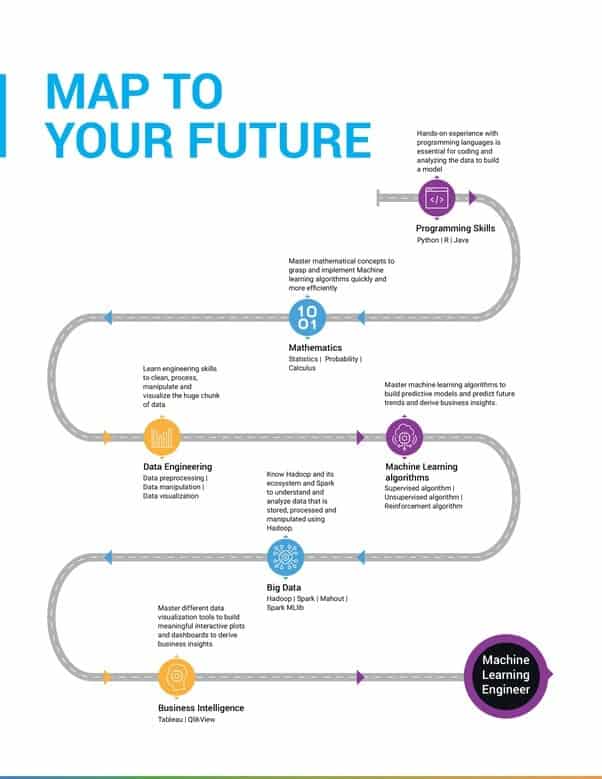
The technology landscape is currently dominated by the world of artificial intelligence or AI. Whether you receive personalized recommendations based on your past shopping experience on ecommerce websites or watch any software recognizing your face or any other image, some form of AI is what works behind. Machine learning, a popular branch of AI, is also getting much traction among companies these days. Every industrial sector, today, from social media to retail or telecommunications, requires skilled machine learning engineers.
Machine learning engineers have contributed a lot to how we perceive things today with the help of technology. If you refer to the report by Robert Half, Jobs and AI Anxiety, it reveals that a whopping 30% of the US managers told that their organizations were using AI and machine learning. Moreover, 53% of the respondents expected to do so within a few years. Evidently, more IT professionals today are willing to explore this career domain.
Do you too wish to enter the fascinating world of AI and machine learning? If yes, then this article explains to you the skills required to become a machine learning engineer and how does a machine learning certification course help in taking one’s career ahead.
What is a Machine Learning Engineer?
AI technologies try to make machines capable of mimicking human intelligence to perform many complex tasks that would otherwise be not possible without human intervention. Machine learning is the fastest-growing subset of AI that deals with using statistical analysis to help machines learn through repeated experiences.
Machine learning engineers basically handle the responsibility of creating such algorithms that allow machines to perform actions without being specifically told to, i.e., by allowing machines to “learn.” They design self-running software to automate predictive models in such a way that each time the software performs an operation, it takes feedback from the generated output to perform the next operation with better accuracy. This is how the overall learning of the software takes place.
Machine learning engineers design and develop ML systems and schemes, perform statistical analysis and use the results to improve the accuracy of the model, training the ML models using various algorithms, running regression analysis, and predict and interpret data using core math skills.
Getting a job as a Machine Learning Engineer would make you capable of earning lucrative salaries. The reason is the fact that though the demand for trained professionals is high, there aren’t enough candidates suitable for such a highly technical role. So, if you are interested in learning more about the AI world, then why not gain the skills of a Machine Learning Engineer.
Your Path to Becoming a Machine Learning Engineer
You need the right blend of skills for any designation you want to achieve. The same holds true for a Machine Learning Engineer. Though the experience and educational background may vary for different professionals, here are some of the skills that are surely necessary for this position.
- You should be strong with core math, including probability, calculus, linear algebra, and statistics.
- Proficiency in at least one of the programming languages like Java, Python, or R is necessary.
- Types of machine learning i.e. supervised, unsupervised, and reinforcement learning algorithms.
- Thorough knowledge of data preprocessing, data manipulation, and data visualization.
- Working with data sets, classifying them, and identify patterns or trends and predict regressions or anomalies.
- Understanding of machine learning frameworks like TensorFlow, Scikit-learn, PyTorch, or Google Cloud ML Engine. The programming language you choose and the type of data sets you work with decide the framework to be used.
- A basic understanding of big data and Hadoop.
- Hands-on experience of working with Business Intelligence tools like Tableau and QlikView.
Apart from the job role of a machine learning engineer, these skills are also useful in other related designations like data engineer, data scientist, AI engineer, business intelligence analyst, and more.
Career Outlook
As automation is dominating the current market, many are of the opinion that their jobs are at risk. But, if reports by the World Economic Forum (WEF) are to be believed, AI and ML will create more job opportunities than it is likely to destroy – though 75 million jobs are to be displaced with automation by 2022, around 133 million new jobs will emerge by the same time. A study by IBM Institute for Business Value further points out that over 120 million workers in the world’s twelve largest economies will need to be reskilled due to due to AI and Intelligent Automation.
These figures give you a clear idea that AI and ML talent is in high demand and why there is a need for professionals to upgrade their skills to future-proof their career. If you just navigate through job portals like Indeed.com or Naukri, you would find there are so many companies having vacancies for ML engineers. And this trend isn’t going to diminish any time soon. So time is ripe to take advantage of the AI and ML talent shortage and enter this promising career field.
Bottom Line
The adoption of artificial intelligence and machine learning is only in its initial stages at present. The true potential of AI is yet to come and people would witness more technological advancements in the years to come. Now that you are aware of how to become a machine learning engineer, why not take up a machine learning certification program to gain the required skills. There are some reliable training providers that offer best-in-class training to master all the important concepts of machine learning and give hands-on experience of working with industry projects. Join an online course and watch your career growing.



